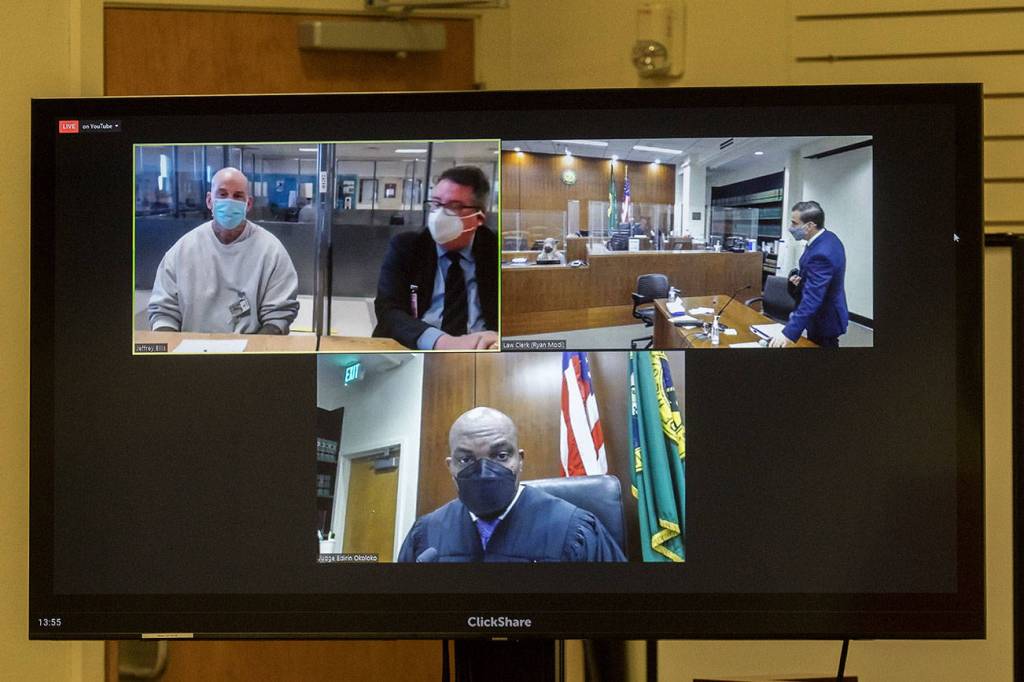Third-strike offender, sentenced to life in 1996, to go free
Published 1:30 am Thursday, February 25, 2021






EVERETT — If Lawrence Dean Fillion were convicted today of robbing the same mini mart of the same armfuls of cigarettes and beer, he would face about 25 months in prison.
Under an outdated law, Fillion served nearly 25 years, with little hope of ever being released.
Snohomish County Superior Court Judge Edirin Okoloko resentenced Fillion on Wednesday under new guidelines, with credit for time served. That means at some point in the next month, Fillion will be a free man.
Robbery in the second degree was considered a “strike” offense in Washington state when a jury convicted Fillion of that crime on July 24, 1996. It was Fillion’s third strike. A Superior Court judge sentenced him to life in prison, as required by law.
Legislators eliminated second-degree robbery as a strike offense in 2019, but did not make the change retroactive for dozens of offenders already serving life sentences.
After decades of rejected appeals, the Snohomish County Prosecutor’s Office took a fresh look at his case, amid yet another appeal by Fillion to the state Supreme Court, as well as pending legislation that could make the new law retroactive statewide. In January, state Supreme Court justices found that Prosecutor Adam Cornell could concede the unconstitutionality of the original sentence, clearing the way for Fillion to be sentenced again.
Seated in front of a video monitor in Walla Walla, the defendant declined to speak Wednesday to a mostly empty courtroom in Snohomish County. Fillion, 49, offered his “deepest apology to the victim” via a statement written by his attorney Jeffrey Ellis. The defendant also thanked the man prosecuting him.
Cornell concluded that “Fillion’s life sentence, under the particular facts of his case, constituted cruel and unusual punishment and a violation of his right to equal protection under both the state and federal constitutions.”
For years, under previous prosecutors, Snohomish County fought against Fillion’s release, in line with a first-of-its-kind three strikes law enacted by Washington voters in 1993. A total of 12 people convicted in Snohomish County saw second-degree robbery become one of three strikes that ultimately led to a life sentence, according to the state Department of Corrections. Cornell said Wednesday he had not yet reviewed the other local cases. But if the pending legislation passes, the state could see a wave of hearings like Fillion’s.
“The wisdom of former times is not always timeless,” Cornell wrote in a sentencing document. “This is true of the criminal justice system as well as many other institutions that govern and guide our lives as Americans. The law evolves and continues to do so.”
Fillion had been 24 years old for about 1½ hours when he committed the crime that seemingly put him away for life. Substance abuse was at the root of all three of his strikes.
In court papers filed about a decade ago, Fillion recounted suffering years of trauma, neglect and abuse at the hands of his stepfather. He wrote that he smoked marijuana at age 11, and became addicted to alcohol by age 12.
“I remember running wild,” he wrote, “skipping school, and getting in fights with other kids. I was in a ‘special education’ program and I was teased by other kids for being in that program. I was very lonely when I was a kid.”
He would get drunk before class at Bellevue High School. His friends were kids in gangs. Drinking, he wrote, seemed to him more important than eating. He dropped out in 11th grade. He was homeless at 18, stealing food, sleeping in abandoned homes or boats — “anywhere else I could find that was warm.”
He drank because he felt sorry for himself and unloved, he wrote in a letter published on DailyKos in 2009.
“This biggest problem was I never grew into a man,” he wrote. “I did things men do, but my maturity was always a kid.”
Fillion had been on the street for about a year, he wrote, when a teenage girl who had been drinking with his group around 2 a.m. Aug. 9, 1990, separated from them for a moment near a cantina in Bellevue. She returned crying, with her shirt ripped, according to Fillion. She told everyone a man tried to rape her — a story Fillion believed at the time, but later heard may have been untrue. Everyone was intoxicated, including the man, 27. Fillion and the group went looking for him. They chased him, knocked him down and broke his nose while stomping and hitting him. Fillion was convicted of second-degree assault in 1991. He served a nine-month sentence.
Strike one.
In jail, Fillion met a man who became a drinking buddy. One night at a transit center in early 1995, they came across a few teenage boys skateboarding in a garage, according to court records. Fillion and his friend pretended to be undercover police. Fillion pushed one of the teens against the wall and told all of them to throw their wallets on the ground. The pair got away with $20, and Fillion went to Denny’s because he hadn’t eaten in three days, according to Fillion’s account. Police arrested the suspects at the restaurant. Fillion was ordered to serve 15 months for second-degree robbery.
Strike two.
Around 1:30 a.m. on Feb. 13, 1996, two of Fillion’s friends walked into a 7-Eleven in Snohomish County, while Fillion stood outside. His friend Joel Butler bought a candy bar, then snatched two packs of cigarettes when the clerk’s head was turned, according to court records. The clerk asked Butler if he was going to pay for that, and they started yelling at each other. Fillion came inside, screaming. Butler told police he warned his accomplices that the clerk seemed to be going for a gun. According to court records, Butler shouted a threat: “Go ahead and pull your gun out from behind the counter! We got ours!” They took 40 boxes of cigarettes, four or five 40 oz bottles of beer, a few baseball caps and some pocket change.
Butler was convicted of the same crime as Fillion. Based almost entirely on his lack of a serious criminal record, he was handed a sentence of six months.
At the time of the original charges, deputy prosecutor John Stansell requested $250,000 bail for Fillion, noting the defendant was facing his third strike. A jury convicted him.
Strike three.
Snohomish County Superior Court Judge Linda Krese could give him only one sentence under state law: life in prison, with no chance of parole.
Fillion served time at the Washington State Penitentiary in Walla Walla. He appealed but was rejected by a state Court of Appeals mandate in 1999; a personal restraint petition was rejected 2002; and he was rejected again in an appeal deemed “untimely” in 2012, when he argued a life sentence violated the Eighth Amendment’s ban on “cruel and unusual punishment.”
Fillion filed another appeal in August 2019, when state legislation removed second-degree robbery from a list of “most serious offenses.” In some ways, Fillion’s case is not unique. Second-degree robbery is often a shoplifting case that turns into a violent felony offense, when a thief uses force by pushing a clerk, brandishing a weapon, or otherwise making a physical threat.
Some prosecutors around the state have taken a stance against the retroactive removal of second-degree robbery as a strike offense — with enough influence to have it cut out of the 2019 legislation. Cornell has spoken in favor of making the new law retroactive.
“I think it has wide support,” he said Wednesday. “I would expect that it’s going to pass, and that the governor’s going to sign it.”
According to the Associated Press, a disproportionate number of Washington’s third strike offenders are Black. Half have been African Americans, though only 4 percent of the state identifies as Black. Fillion is white.
The prosecutor’s office struggled to reach the 7-Eleven clerk from 24 years ago, to notify him of Cornell’s decision. The man, now 62, was finally contacted over the phone on Tuesday. Cornell said the victim expressed “his adamant opposition” to Fillion being released. The man did not show up to court Wednesday.
The prosecutor said he listened to the man’s concerns, but stood by his decision that “the life sentence for this crime is not proportionate to its seriousness.”
On Wednesday afternoon in Snohomish County Superior Court, the judge approved the new sentence of a little under 2½ years. Fillion has served that sentence 10 times over.
Okoloko turned to the defendant, and told him he hoped he would avoid ever being sentenced for another crime again.
“You now have what I can refer to as a once-in-a-lifetime opportunity,” Okoloko said. “I hope that you recognize the magnitude of the break that you have received.”
As he lost appeal after appeal, Fillion also lost hope, he wrote in court records. But over the years he worked in the prison kitchen, earned his GED and grew closer to his family than he had ever been. He kept trying to make his appeal heard through a variety of methods. In one case his father Dean Fillion wrote in support of his son, saying the younger Fillion took responsibility for his past behavior.
“I see a huge change in his perspective on life,” the father wrote. “I believe he has a sincere desire to become a contributing member of the community. He has matured and does not seem like the same person he was when he went into prison.”
That appeal was rejected when the state Supreme Court declined to review it.
“I see life so differently as a 39 year old man,” Fillion wrote at the time, in his own sworn declaration, “and know I have great potential.”
This month, Fillion turned 49.
Caleb Hutton: 425-339-3454; chutton@heraldnet.com. Twitter: @snocaleb.










